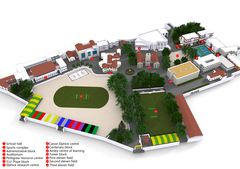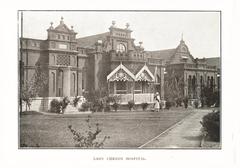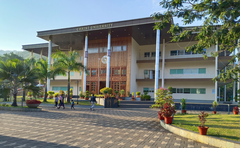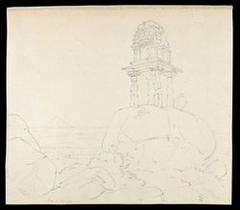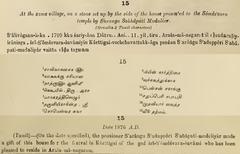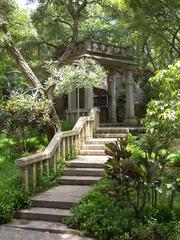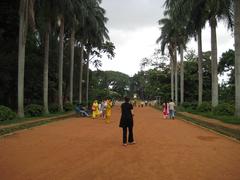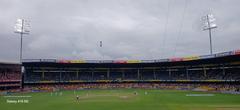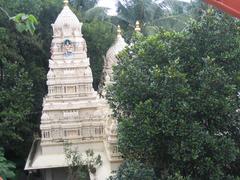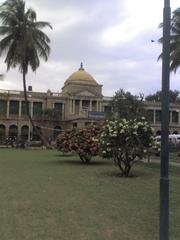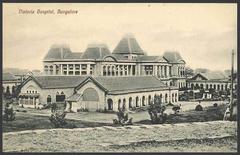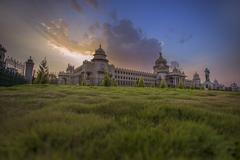Visiting Freedom Park: Hours, Tickets, and Nearby Attractions in Bangalore
Date: 17/07/2024
Introduction
Freedom Park in Bangalore, India, is a site that seamlessly blends historical significance with modern recreational amenities. Known for its rich past as the Central Jail of Bangalore, this park has been transformed into a public space that commemorates India’s struggle for independence while offering a serene environment for various activities. Established in 1866 during British colonial rule, the Central Jail housed numerous freedom fighters, including Mahatma Gandhi. After its decommissioning in 2000, the site underwent a significant transformation and was inaugurated as Freedom Park in 2008. Today, it stands as a symbol of resilience and freedom, serving as a venue for public gatherings, protests, and cultural events (BBMP).
Table of Contents
- Introduction
- Historical Background
- Transformation into Freedom Park
- Significance in Modern Times
- Architectural and Cultural Features
- Educational and Recreational Importance
- Visitor Information
- Travel Tips and Nearby Attractions
- Commemorative Events and Activities
- FAQ
- Conclusion
Historical Background
Freedom Park, located in the heart of Bangalore, India, is a site steeped in historical significance. Originally, this area served as the Central Jail of Bangalore, established in 1866 during the British colonial era. The jail was designed to incarcerate freedom fighters and political prisoners who opposed British rule. The structure of the jail was typical of colonial architecture, with high walls and watchtowers, symbolizing the oppressive regime of the time.
The Central Jail played a crucial role during India’s struggle for independence. Many prominent freedom fighters, including Mahatma Gandhi, were imprisoned here. The jail’s history is a testament to the sacrifices made by countless individuals in the fight for India’s freedom. After India gained independence in 1947, the jail continued to function until 2000, when it was decommissioned and later transformed into Freedom Park.
Transformation into Freedom Park
The transformation of the Central Jail into Freedom Park was a significant event in Bangalore’s urban development. The park was inaugurated on November 22, 2008, by the then Chief Minister of Karnataka, B. S. Yediyurappa. The project aimed to preserve the historical essence of the site while providing a public space for recreation and reflection.
The design of Freedom Park retains many elements of the old jail, including the watchtowers, barracks, and the central tower. These structures serve as a reminder of the site’s past and its role in India’s fight for independence. The park also features a museum that showcases the history of the jail and the stories of the freedom fighters who were imprisoned there.
Significance in Modern Times
Freedom Park holds immense significance in modern times, both as a historical monument and a public space. It serves as a symbol of India’s hard-won freedom and the enduring spirit of its people. The park is a popular venue for public gatherings, protests, and cultural events, reflecting its role as a space for free expression and civic engagement.
One of the most notable events held at Freedom Park was the anti-corruption protest led by Anna Hazare in 2011. The park became the epicenter of the movement in Bangalore, drawing thousands of people who gathered to demand stronger anti-corruption laws. This event underscored the park’s importance as a space for democratic expression and activism.
Architectural and Cultural Features
Freedom Park is not just a historical site; it is also a cultural landmark. The park’s design incorporates various elements that reflect its dual role as a memorial and a public space. The central tower, which was once the watchtower of the jail, now serves as an observation deck, offering panoramic views of the city. The barracks have been converted into exhibition halls that host art shows, cultural events, and educational programs.
The park also features an amphitheater, a children’s play area, and landscaped gardens, making it a popular destination for families and tourists. The integration of these modern amenities with the historical structures creates a unique blend of the past and the present, making Freedom Park a living monument to Bangalore’s history and culture.
Educational and Recreational Importance
Freedom Park serves an important educational purpose by preserving and presenting the history of the Central Jail and the freedom struggle. The museum within the park offers detailed exhibits on the history of the jail, the lives of the prisoners, and the broader context of India’s fight for independence. These exhibits provide valuable insights into the sacrifices made by freedom fighters and the harsh conditions they endured.
In addition to its educational value, Freedom Park is a vital recreational space in Bangalore. The park’s open spaces, gardens, and play areas provide a much-needed respite from the hustle and bustle of the city. It is a place where people can relax, exercise, and enjoy the outdoors while reflecting on the historical significance of the site.
Visitor Information
Visiting Hours - Freedom Park is open to the public every day from 5:00 AM to 8:00 PM.
Entry Fee - Entry is free.
Guided Tours - Guided tours are available for those who wish to learn more about the history of the site and its significance.
Accessibility - The park’s central location makes it easily accessible by public transport, and there are ample parking facilities for those who prefer to drive. The park is also equipped with amenities such as restrooms, drinking water stations, and seating areas, ensuring a comfortable experience for visitors.
Travel Tips and Nearby Attractions
- Best Time to Visit - Early mornings or late afternoons are ideal for visiting to avoid the midday heat.
- Nearby Attractions - Vidhana Soudha, Cubbon Park, and Bangalore Palace are located nearby and can be included in your itinerary for a comprehensive tour of Bangalore’s historical sites.
- Photography Spots - The central tower and landscaped gardens offer great spots for photography.
Commemorative Events and Activities
Freedom Park hosts a variety of commemorative events and activities throughout the year. These events include Independence Day celebrations, cultural festivals, and public lectures on historical and social issues. The park’s amphitheater is a popular venue for performances, including music concerts, theater productions, and dance shows.
One of the key annual events at Freedom Park is the celebration of Gandhi Jayanti on October 2nd, which marks the birthday of Mahatma Gandhi. The event includes speeches, cultural performances, and activities that highlight Gandhi’s contributions to India’s independence and his philosophy of non-violence.
FAQ
Q: What are the visiting hours for Freedom Park?
A: Freedom Park is open every day from 5:00 AM to 8:00 PM.
Q: Is there an entry fee for Freedom Park?
A: No, entry to Freedom Park is free.
Q: Are guided tours available?
A: Yes, guided tours are available for visitors who want to learn more about the park’s history and significance.
Q: What amenities are available at Freedom Park?
A: The park offers restrooms, drinking water stations, seating areas, a children’s play area, and ample parking facilities.
Conclusion
Freedom Park stands as a testament to Bangalore’s rich history and its ongoing commitment to preserving and celebrating its cultural heritage. The park’s transformation from a colonial-era jail to a vibrant public space reflects the city’s resilience and its dedication to the principles of freedom and democracy. For visitors, Freedom Park offers a unique opportunity to connect with India’s past while enjoying the amenities of a modern urban park.
Stay updated on events and activities at Freedom Park by following BBMP and consider downloading our mobile app Audiala for more tips and information on historical sites in Bangalore.

